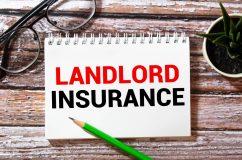How Velox Insurance Can Help Landlords Protect Their Rental Properties
Owning a rental home or small multifamily in Georgia can be a steady source of income if you protect it correctly. Between severe thunderstorms, tropical-storm remnants, occasional tornadoes, and everyday tenant mishaps, one uncovered event can wipe out months (or years) of cash flow.
This guide explains how landlord insurance works, the key risks Georgia landlords face, and practical steps to build strong rental property coverage. We’ll also show how a good insurer simplifies the process and helps you protect rental property investments with the right policy structure — especially when you’re comparing landlord insurance quotes.
Understanding Landlord Insurance
Landlord insurance (sometimes called “dwelling fire” or rental property protection/insurance) is designed for homes you rent to others. Unlike owner-occupied homeowners insurance, landlord policies assume you’re not living there and tailor the protections to your role as a lessor.
What It Covers vs. Standard Home Insurance
You own rental properties — do you need basic home insurance? Well, here’s the scoop. Homeowners insurance is built for owner-occupied residences and typically excludes or restricts coverage if the property is tenant-occupied. If you’ve converted a home to a rental, switching to landlord insurance is essential for claim integrity. A solid landlord policy usually includes the following property damage coverage:
- Dwelling & Other Structures: Repairs for covered property damage to the building and detached structures (e.g., a shed or fence). Many Georgia landlords choose replacement cost coverage for the structure instead of actual cash value to avoid depreciation shortfalls.
- Landlord Liability Insurance: If a tenant or guest alleges bodily injury or property damage due to your negligence (think: a loose handrail or icy walkway), liability may cover legal defense and settlements up to your limit.
- Loss of Rents (Fair Rental Value): Reimburses lost rental income while the home is uninhabitable due to a covered claim (for example, a kitchen fire). This is different from “rent guarantee” or nonpayment of rent, which is usually excluded unless specifically endorsed by specialty products.
- Medical Payments to Others: Limited, no-fault medical coverage for minor injuries that occur on the premises.
Why Every Landlord Needs It
Whether you’re renting out a room or running a large commercial-scale business, landlords like you need insurance. Rentals face different risk profiles than primary homes, such as turnover, vacancy, and varied maintenance habits by tenants. In Georgia, weather-related losses (wind, hail, lightning) can be significant, and liability exposures rise when you’re not on site daily. A proper landlord insurance policy is how you convert those uncertainties into manageable, budgetable costs.
Types of Risks for Georgia Landlords
Georgia isn’t terribly unique when it comes to risk, but there are a few things to think about in the Peach State. Chief among them — natural disasters. But also the regular tenant risks you might expect to face in the rental business.
Natural Disasters and Weather Damage
Georgia experiences severe thunderstorms, hail, lightning, tornadoes in certain regions, and the inland effects of tropical systems. Most standard landlord policies cover wind, hail, and lightning, subject to deductibles (sometimes a separate percentage deductible for wind/hail). Important: Flood (rising water from outside) is typically excluded and requires a separate flood policy. Sewer or sump backup is also commonly excluded unless you add a water/backup endorsement.
Tenant-Related Risks and Liability
Kitchen fires, water leaks, and minor vandalism can escalate quickly without prompt attention. That’s why you need accidental damage coverage. In addition, you’ll want to protect against trip and fall (or slip and fall) claims, dog bites (although keep in mind breed restrictions), and injuries from alleged maintenance lapses that can trigger costly legal battles.
Something to consider: Tenant liability refers to damage a tenant causes to others; your landlord liability insurance addresses claims made against you as the owner/manager. Encourage tenants to carry renters insurance to protect their belongings and personal liability; pair your landlord policy with a renters program.

Tips for Choosing the Right Landlord Policy
There’s a certain art to customizing your policy to be appropriate to your financial situation. It’s the intersection between what you can self-insure, what your risks are, and what your potential losses might be in relation to the above. Here’s what to think about.
Coverage Limits and Deductibles
- Dwelling Limit: Aim for the rebuild cost, not market value. Rebuilding includes labor and materials, which don’t fall just because the market does.
- Liability Limit: Many landlords pick at least $300,000 to $500,000. If you own multiple rentals or have a higher net worth, consider umbrella coverage for added protection above your base policy.
- Loss of Rents: Match the monthly rent times the anticipated repair timeline for your area. If a major kitchen and flooring rebuild could reasonably sideline the unit for four months, price that into your limit.
- Deductible: Higher deductibles reduce premiums. Pick a number you could comfortably pay in an emergency without delaying repairs.
Optional Add-Ons to Consider
Depending on the property, occupancy type, and carrier, you may be able to add some optional add-ons. These are not necessary for every landlord in the Peach State, but you may want to discuss with your agent the following rental property insurance tips:
- Water/Sewer Backup: Covers damage from backups and overflows not caused by flood.
- Equipment Breakdown: Helps repair or replace systems like HVAC, water heaters, or appliances when they fail due to a covered mechanical/electrical breakdown (distinct from wear and tear).
- Service Line Coverage: Buried utility lines from the street to the home can be costly to repair; this endorsement can help.
- Ordinance or Law (Code Upgrade): Pays for code-required upgrades after a covered loss, esp. valuable for older Georgia homes.
- Landlord Contents: If you provide furnishings or appliances, insure them separately from tenant belongings.
- Short-Term Rental Endorsements: If you allow short stays, confirm the policy is specifically endorsed. Standard policies may exclude business-like short-term rental activity without proper endorsement.
- Umbrella Liability: Extends above underlying liability limits for larger claims. This can cost-effectively transfer risk across multiple rentals.
How Velox Insurance Helps Simplify Landlord Coverage
As an independent agency serving Georgia, Velox shops multiple carriers to match coverage details and pricing to your property profile. That saves you time and helps avoid gaps that can appear when you piece together coverage on your own. We bring expertise to the table.
Secure Your Investment Now with Velox Landlord Insurance
Your rental is a business. Treat its risk financing like one. Talk with Velox to structure property insurance in Georgia that balances premiums, deductibles, and endorsements, so a single event doesn’t erase a year’s cash flow. Start now: give us a call at (855) 468-3569, get more info in person at one of our local offices in Georgia, or get a quote online!
FAQs
Does Landlord Insurance Cover Tenant Damage?
It covers accidental damage from covered perils (fire, smoke, sudden water discharge). Intentional damage or wear and tear is generally excluded. Consider security deposits, solid screening, and lease language. Requiring tenant renters insurance helps address tenant liability to others.
Can I Include Multiple Properties Under One Policy?
Often yes. Some carriers allow schedules of one-to-four family dwellings on a single policy; larger portfolios may benefit from commercial rental insurance packaging. Velox can advise on when to consolidate.
Does Landlord Insurance Cover Legal Fees?
Liability coverage typically includes your legal defense for covered bodily injury or property damage claims. Evictions, contract disputes, and fair-housing issues are usually excluded unless you purchase a separate legal/landlord protection product.
How Much Coverage Do I Need for My Rental Property?
Insure your property to the rebuild cost (not market value). Choose liability limits that reflect your net worth and exposure, and set loss of rents to match realistic downtime after a serious claim. Velox can help set these numbers with carrier-specific tools.
Are Natural Disasters Included in Standard Policies?
Most policies cover wind, hail, and lightning (subject to deductibles). Flood requires a separate policy. Earthquake is generally excluded unless endorsed. Ask Velox to review region-specific deductibles and exclusions before storm season.



